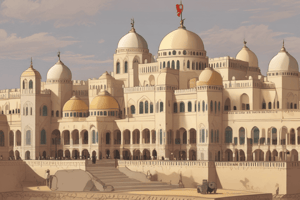Podcast
Questions and Answers
What is the primary characteristic of an absolute monarchy?
What is the primary characteristic of an absolute monarchy?
- The monarch's powers are limited by a constitution
- The monarch serves a ceremonial role
- The monarch has complete control and authority over the government and people (correct)
- The monarch is elected by a group of people or a council
What is the typical method of succession in a monarchy?
What is the typical method of succession in a monarchy?
- Election by a council of leaders
- Hereditary succession (correct)
- Appointment by a government official
- Random selection by lottery
Which of the following is an example of a ceremonial duty performed by a monarch?
Which of the following is an example of a ceremonial duty performed by a monarch?
- Appointing government officials
- Signing legislation into law
- Leading military campaigns
- Hosting state visits (correct)
What is the role of a monarch in a constitutional monarchy?
What is the role of a monarch in a constitutional monarchy?
What is the typical duration of a monarch's reign?
What is the typical duration of a monarch's reign?
Which country is an example of an elective monarchy?
Which country is an example of an elective monarchy?
Flashcards
Monarchy
Monarchy
A system of government ruled by a single person who typically inherits power.
Absolute Monarchy
Absolute Monarchy
Type of monarchy where the ruler has total authority.
Constitutional Monarchy
Constitutional Monarchy
Type of monarchy where the ruler's power is limited by law.
Elective Monarchy
Elective Monarchy
Signup and view all the flashcards
Symbolic Role
Symbolic Role
Signup and view all the flashcards
Saudi Arabia
Saudi Arabia
Signup and view all the flashcards
Study Notes
Monarchy
Definition
- A system of government where a single person, typically a king or queen, holds supreme power and authority
- The monarch serves as the head of state and may also hold executive powers
Types of Monarchy
- Absolute Monarchy: The monarch has complete control and authority over the government and people
- Constitutional Monarchy: The monarch's powers are limited by a constitution or laws, and they serve a ceremonial role
- Elective Monarchy: The monarch is elected by a group of people or a council, rather than inheriting the position
Characteristics
- Hereditary: The position of monarch is typically passed down through family lines
- Lifetime Reign: Monarchs usually serve for life, unless they abdicate or are removed
- Symbolic Role: Monarchs often serve as a symbol of national identity and unity
- Ceremonial Duties: Monarchs perform ceremonial roles, such as hosting state visits and awarding honors
Examples of Monarchies
- United Kingdom: A constitutional monarchy, where the monarch (currently King Charles III) serves a ceremonial role and has limited powers
- Saudi Arabia: An absolute monarchy, where the monarch (currently King Salman) holds significant power and authority
- Brunei: An absolute monarchy, where the monarch (currently Sultan Hassanal Bolkiah) holds complete control over the government and people
Monarchy
Definition and Characteristics
- A system of government where a single person, typically a king or queen, holds supreme power and authority
- Monarchs serve as the head of state and may also hold executive powers
- Typically, the position of monarch is hereditary, passed down through family lines
- Monarchs usually serve for life, unless they abdicate or are removed
Types of Monarchy
- Absolute Monarchy: The monarch has complete control and authority over the government and people
- Constitutional Monarchy: The monarch's powers are limited by a constitution or laws, and they serve a ceremonial role
- Elective Monarchy: The monarch is elected by a group of people or a council, rather than inheriting the position
Characteristics of Monarchies
- Symbolic Role: Monarchs often serve as a symbol of national identity and unity
- Ceremonial Duties: Monarchs perform ceremonial roles, such as hosting state visits and awarding honors
Examples of Monarchies
- United Kingdom: A constitutional monarchy, where the monarch (currently King Charles III) serves a ceremonial role and has limited powers
- Saudi Arabia: An absolute monarchy, where the monarch (currently King Salman) holds significant power and authority
- Brunei: An absolute monarchy, where the monarch (currently Sultan Hassanal Bolkiah) holds complete control over the government and people
Studying That Suits You
Use AI to generate personalized quizzes and flashcards to suit your learning preferences.




